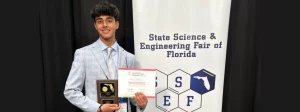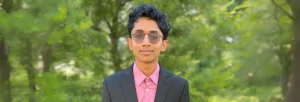(June 20, 2025) One evening in Virginia, Vidya Ambati noticed her grandmother struggling to knead dough for dinner. Her hands were stiff from arthritis, and even small movements caused pain. Vidya didn’t know much about the condition then, but the moment stayed with her. It was an ordinary family moment – an Indian American girl in Charlottesville helping in the kitchen – but it stayed with Vidya. Years later, that small experience would become the starting point for her interest in studying arthritis and finding better ways to treat it.
Growing Up Between Two Worlds
Her story is, in many ways, a classic tale of growing up straddling two cultures. Born and raised in the US as the daughter of Indian immigrants, she learned to navigate the contrasts of her dual identity. At home, she enjoyed homemade pizza nights with her family – in fact, making pizza together with my family is her favourite tradition – and celebrated American holidays with as much gusto as Diwali. At the same time, her parents made sure she absorbed the values they carried from India: a deep respect for education, a strong work ethic, and the idea that knowledge should serve the community. They had moved from India to start a new life in America and taught Vidya that she could make their efforts worthwhile by using her opportunities to do something meaningful.
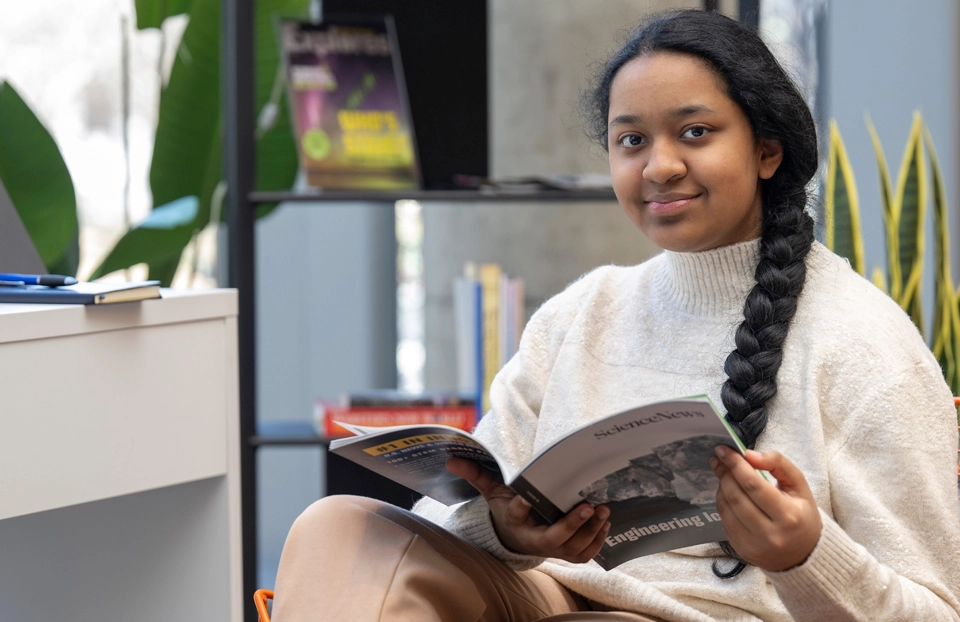
Vidya Ambati
Vidya was a curious child who loved asking questions—about the sky, the human body, and how things worked. Her parents didn’t mind her endless “why’s”—they supported her curiosity. “I really enjoy using science and the scientific process of discovery and development to improve human health, she later said. Visits to science museums, stories about inventors, and trips to see family in India all sparked her interest even more. By the time she started high school at Albemarle in Charlottesville, she knew she wanted to use science to help people—just like she once wanted to help her grandmother.
A Spark That Lit a STEM Passion
In high school, Vidya threw herself into science fairs and research projects. She didn’t just want to read about science—she wanted to try it for herself. She was lucky to find mentors in her community, especially at the nearby University of Virginia, who saw her passion and helped guide her. Soon, she was spending her afternoons reading scientific papers, learning how to work in a lab, and analyzing data that would challenge even college students. Her parents, though not scientists, supported her every step of the way. They had always taught her that curiosity and hard work go together—and those values helped her grow as a young researcher.
One of Vidya’s most formative experiences was starting an international science webinar series from her bedroom. Noticing that many students – especially in underrepresented communities – lacked access to high-level STEM learning, Vidya took it upon herself to bridge that gap. She organized webinars connecting students in multiple countries with leading scientists around the world. It started as a small project, but it quickly grew. Vidya led these sessions with confidence and warmth, helping other students understand complex science topics. She wasn’t just learning for herself—she was helping others learn too. Her goal to “promote scientific engagement” around the world became a big part of who she is. It showed both the values from her Indian background, which focused on community, and her American education, which encouraged leadership and taking initiative.
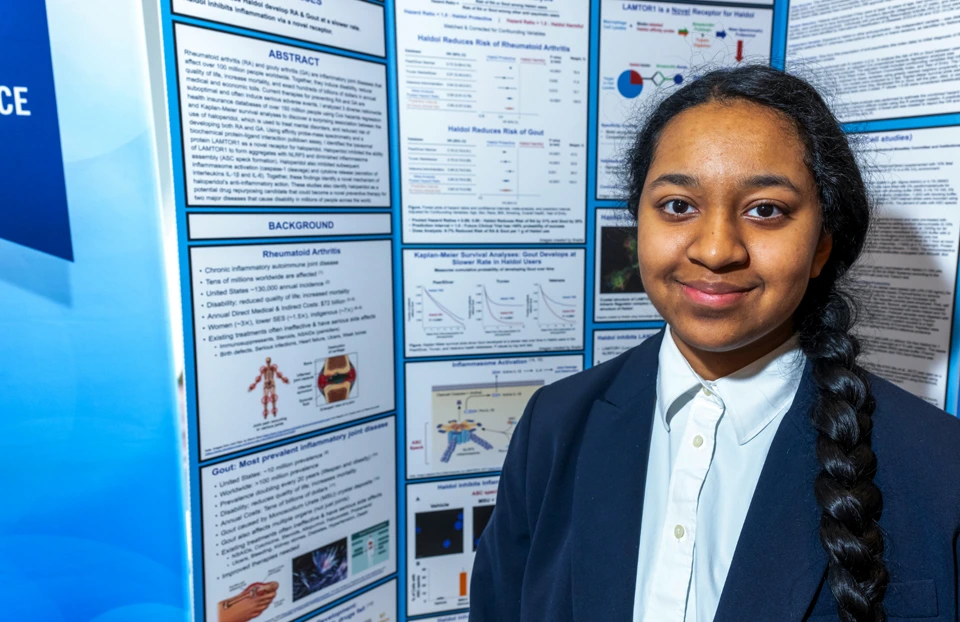

Breaking New Ground in Arthritis Research
Vidya’s curiosity and hard work came together in a major research project she took on in her junior year of high school. Inspired by her wish to help her grandmother, she began studying rheumatoid and gouty arthritis—painful diseases that affect millions of people around the world. What made her project special was the way she looked at the problem differently. Instead of only focusing on new treatments, she asked if a drug already being used for something else might also help with arthritis. If it worked, it could save a lot of time and money.
While studying large sets of health data, Vidya noticed something unusual: people who were taking haloperidol—a drug usually used to treat mental health conditions like schizophrenia—seemed to have a lower risk of developing rheumatoid arthritis and gout. “It was a surprising discovery,” she said. It made her wonder: could this drug be doing more than people thought?
Curious to understand why this was happening, Vidya began deeper lab research. She didn’t stop at the numbers—she wanted to find the science behind them. In the lab, she discovered that haloperidol was connecting with a protein in the body called LAMTOR1. This protein plays a key role in controlling inflammation in the immune system. When haloperidol binds to it, the body’s inflammation response slows down. That could explain why patients on this drug had fewer arthritis symptoms. In simple terms, Vidya found that this old medicine might have a new purpose—it could help treat arthritis by calming the immune system.
Her project opened the door to a new way of thinking: instead of inventing a brand-new medicine, maybe doctors could use haloperidol in a new way to treat joint diseases. This approach could save years of research and, as Vidya pointed out, even “billions of dollars in developing new treatments.” “My work has the potential to affect millions of people’s lives,” she wrote.
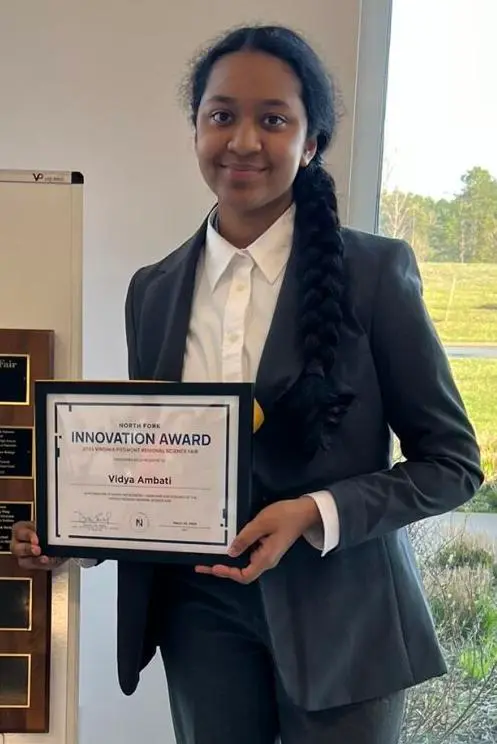

National Recognition and Accolades
News of Vidya Ambati’s research spread quickly in the science competition world. In early 2025, she was named one of the Top 40 finalists in the Regeneron Science Talent Search, the most prestigious science contest for high school students in the U.S. Chosen from nearly 2,000 applicants, Vidya was invited to Washington, D.C., to present her work alongside other top young scientists. Her project stood out not only for its results, but for the creative way she approached the problem—using an existing drug in a new way to tackle arthritis.
A few months earlier, in the summer of 2024, Vidya had also been named a Davidson Fellow Laureate, one of only four students in the country to receive the honor that year. The award recognized both the depth of her research and its potential to make a real difference in people’s lives. “To me, being a Davidson Fellow means exploring the mysteries of the universe with curiosity, diligence and purpose.”
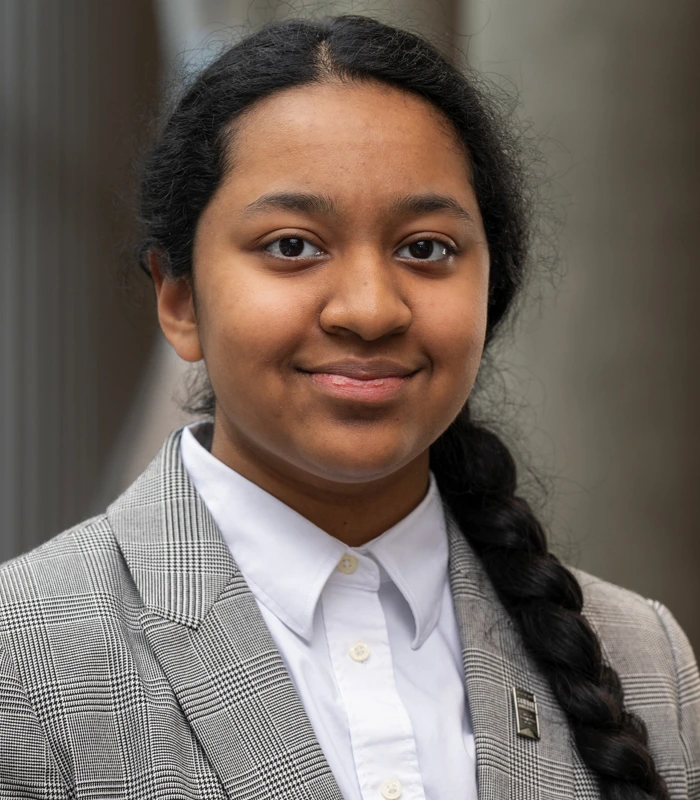

A Young Changemaker in the Indian Diaspora
At 18, Vidya Ambati is stepping into a bright future, proud of her Indian roots and the path she’s creating for herself. Within the Indian American community, she’s already seen as a role model—proof that young people can stay connected to their heritage while building something new. She often talks about how her family and the Indian community in Virginia helped shape her values. Whether it was helping with Diwali food drives or volunteering at kids’ science camps, Vidya has always looked for ways to give back. It’s part of the Indian value of seva—or service—that she carries with her.
Through her science webinar series, she’s connected students from different countries, showing that learning can cross borders. In doing so, she’s become a quiet leader—someone who shows what children of immigrants can bring to the world through both knowledge and kindness.
Looking ahead, Vidya plans to study biomedical engineering or molecular biology in college, and she hopes to continue her arthritis research. She sees herself as a mix of many things: Indian and American, scientist and artist (her landscape paintings have even been shown in a state museum), researcher and mentor. That mix is what makes her who she is. In her own words, being a young innovator is like being a bridge—“connecting different ideas, different people, and even different parts of yourself, to build something new.” For Vidya, that “something new” includes not just a possible treatment for arthritis, but also a future where science, culture, and compassion come together.
Inspiring the Next Generation
Vidya Ambati’s journey is just beginning, but she’s already inspiring others. At her high school, younger students look up to her and think, “Maybe I can do that too.” In the Indian American community, parents share her story with pride—showing what’s possible when hard work, family support, and passion come together. More broadly, her success sends a clear message: age doesn’t matter as much as the courage to ask “why not?” and the determination to find answers.
From the girl who once watched her grandmother struggle with arthritis, to the young scientist now sharing her work with experts, Vidya’s story has always been guided by curiosity and care. At a time when the world needs fresh ideas—especially in health and in making science more inclusive—Vidya shows what a new generation can bring. Her research on arthritis is only part of her impact. She’s also quietly challenging old ideas about who gets to lead in science, showing that a young Indian American can take on big problems in her own unique way.
- Follow Vidya Ambati on LinkedIn


